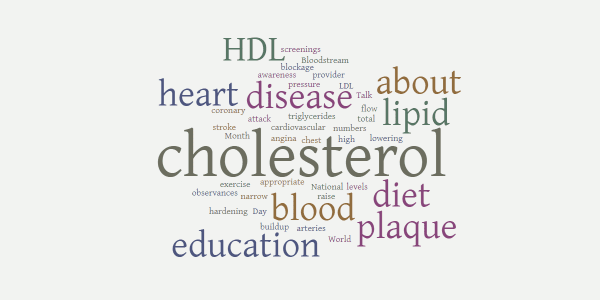September is National Cholesterol Education Month and Sept. 29 is World Heart Day. These observances raise awareness about cardiovascular disease, cholesterol and stroke. Talk to your healthcare provider about appropriate screenings.
Cholesterol is a waxy, fat-like substance that your body needs. But when you have too much in your blood, it can build up on the walls of your arteries, which can lead to heart disease and stroke. Several factors that are beyond your control can increase your risk. These include your age, sex, and heredity. But there are some risk factors that you can change. Examples include eating an unhealthy diet, being overweight, and not getting enough exercise.
High cholesterol itself does not have symptoms. Many people do not know that their cholesterol level is high. That’s why it’s important to schedule regular visits with your doctor. Be sure to ask about having your cholesterol tested.
Samuel M. Butman, MD, MHA, FACC, FSCAI, interventional cardiologist and medical director of Cardiovascular Clinical Research at Northern Arizona Healthcare’s Heart & Vascular Center of Northern Arizona, answers some questions about heart disease and cholesterol.
What are some early-detectable signs of heart disease?
Chest discomfort and shortness of breath with exertion are two major clues. I cannot overemphasize the importance of knowing your cholesterol numbers, checking your blood pressure and being more aware if there is a significant immediate family history – siblings and parents − of heart disease.
What are some ways people above the age of 50 can keep their hearts healthy?
If you’re a smoker, stop smoking or seek help in doing so. There are many options available these days. Verde Valley Medical Center offers a Freedom From Smoking course.
If you haven’t done so already, please get a cholesterol and blood pressure screening – this is especially important when there’s a family history of heart disease.
Can a noticeably healthy person who exercises and eats right also fall victim to heart disease?
Yes, unfortunately, if cholesterol levels are abnormal or there’s a family history of heart disease. Heart disease can and does strike anyone. It is not uncommon for people who exercise regularly to have heart-related issues.
What is the answer for someone who seems to do all the right things with his or her body?
Keep doing it, for sure. Do not avoid knowing and using the benefits modern healthcare can offer to further reduce your risk of heart disease, while doing all of the right things for your health.
If you need cardiac care, look no further than Northern Arizona Healthcare. Our full range of cardiac care includes minimally invasive heart and vascular procedures, noninvasive cardiology procedures and electrophysiology services. Learn more.
